Welcome! Here are the website rules, as well as some tips for using this forum.
Need to contact us? Visit https://heatinghelp.com/contact-us/.
Click here to Find a Contractor in your area.
If our community has helped you, please consider making a contribution to support this website. Thanks!
PSI drops to 5 in 1927 gravity fed forced hot water system with 2015 boiler
Options
gsk3
Member Posts: 21
We have a 1927 house in the mid-Atlantic with what I believe is a converted gravity-fed hot water system (largish pipes, some takeoffs horizontal, others at a 45 degree upwards angle, see pictures).
===Short version and question===
- 1927 house, 5 year old boiler (Buderus) and circ pumps, 1 zone plus indirect hot water
- About 14 radiators currently connected
- Pressure dropping to 5psi but then holds steady there with house staying warm
- Do I have a leak somewhere? How do I diagnose where?
===Longer version===
This is the first boiler/radiator home I've lived in (bought 1.5 years ago), so at the beginning of the heating season we had the company out that installed the new boiler in 2015. That routine maintenance visit was very frustrating in retrospect. The tech checked a few valves, gave a cursory glance in the boiler with a flashlight, and then checked the OPV. The OPV kept dripping for at least 5 minutes after he flipped it, and he fiddled with it for most of that time before it finally stopped dripping and he declared that to be normal. My understanding after reading Inspectopedia this week is it's not and would have benefitted from replacement. I also mentioned that visit that I had tried adding water (with the boiler cold) to get to 15 psi as the third floor radiators were developing air pockets even after I bled them and were bleeding really slowly, as I'd read that for a third floor installation (four stories up from the boiler which is in the basement) you should aim for 15-18psi. The pressure had dropped back down to 12 psi, which didn't seem right. That was also declared to be normal.
Then a few weeks ago the pressure started dropping further, from 12 to 11 to 10, to 7, to 5(!). I tested the low water cutoff which still worked, so kept the system on so the family had heat and called an escalating number of HVAC and plumbing companies my neighbors recommended, but have had a devil of a time getting someone out. I currently have an appointment for next week with someone whom one of my neighbors trusts a lot.
I also read two of Dan Holohan's books (Classic Hydronics and Pumping Away) and read through a fair number of The Wall posts which helped a lot to understand the system. The more I learn the more worried I am that something is seriously wrong.
On Friday I woke up to a lukewarm bath, said "uh oh," and went to the basement to find the pressure at a tad below 5psi. I added water to get it to 12 psi, overshot a little, decided to test the OPV which would also bleed off a little extra pressure, and the OPV stuck open (a few gallons per hour) despite all attempts at fiddling. At that point I turned off the system, we used space heaters and the gas fireplace, and I spent the day replacing the OPV with an equivalent Watts from Lowe's. Drained the system completely, fixed the valve, refilled repeatedly to 18 psi to help bleed the radiators with the system off, turned the system on, everything got hot (went from 55F house temp to 65F house temp in a few hours). This morning, pressure was back at 5psi.
Hot water circuit's expansion tank (dated 2015) sounds ok from tapping on the side (dull at the top where the water connects, empty at the bottom where the schraeder valve is) and was at 11.5 psi when I checked with the water valve off. Anything else I should check on the expansion tank? The indirect hot water expansion tank sounds water-logged (dated 2013) but that shouldn't affect the boiler hot water circuit, I believe.
Do I have a leak somewhere? How do I diagnose where? Should I check/replace the radiator valves first?
My best guess: there's been a small leak for a long time, the autofill was masking it by adding water to keep it to 12 psi, this crudded up the OPV which leaked, and then the autofill failed or was misadjusted which caused it to drop to 5psi which revealed the problem.
We really don't want a whole crew in the house tearing up pipes until COVID is over, so if it is a leak can we just fix the autofill and leave it at 12psi for the rest of the winter?
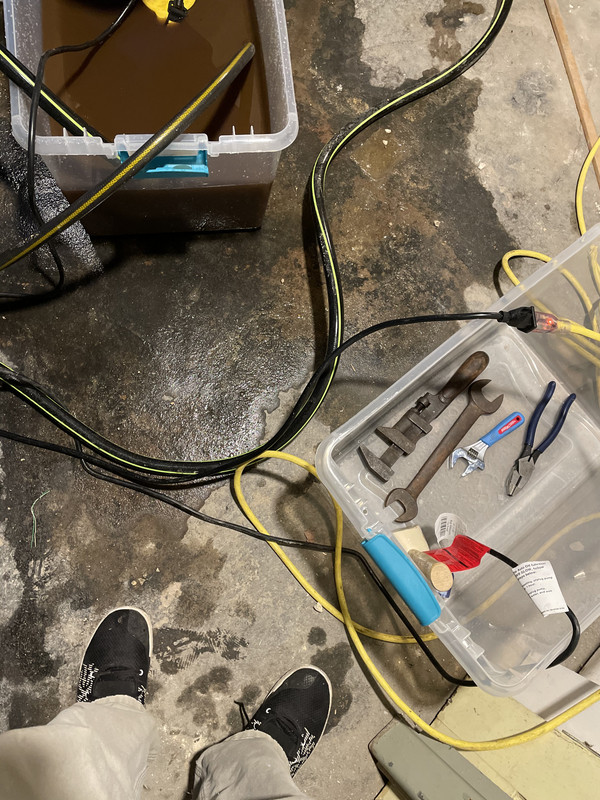
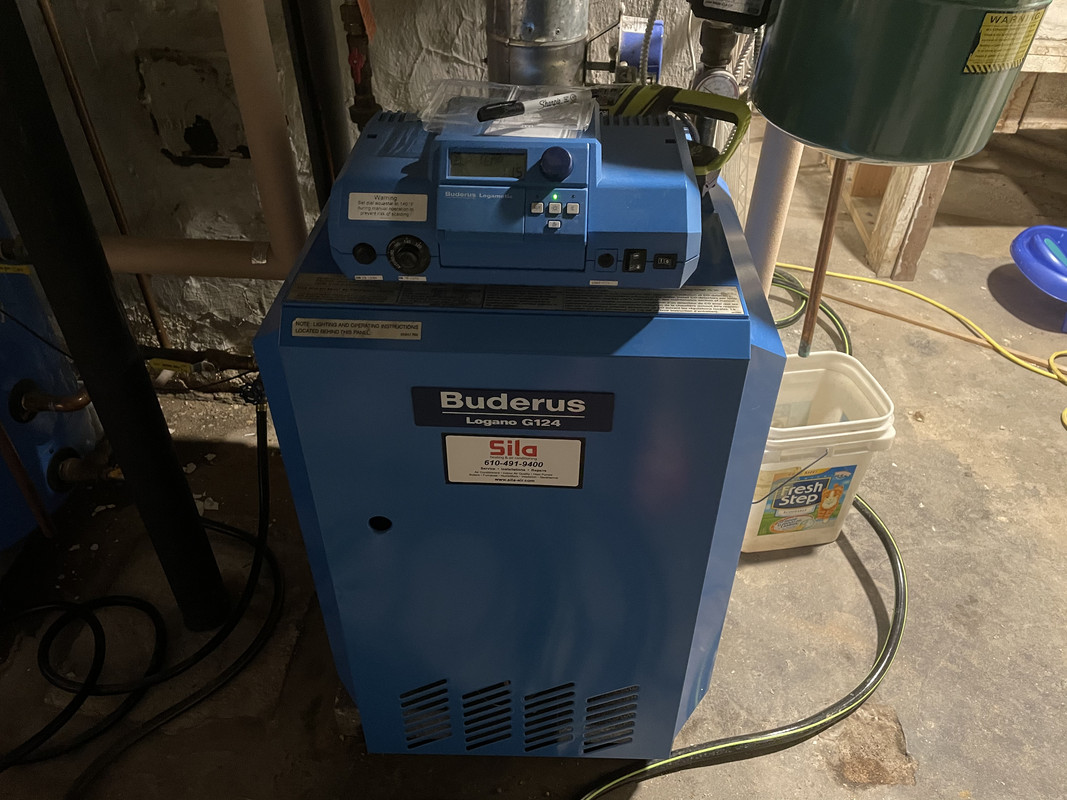
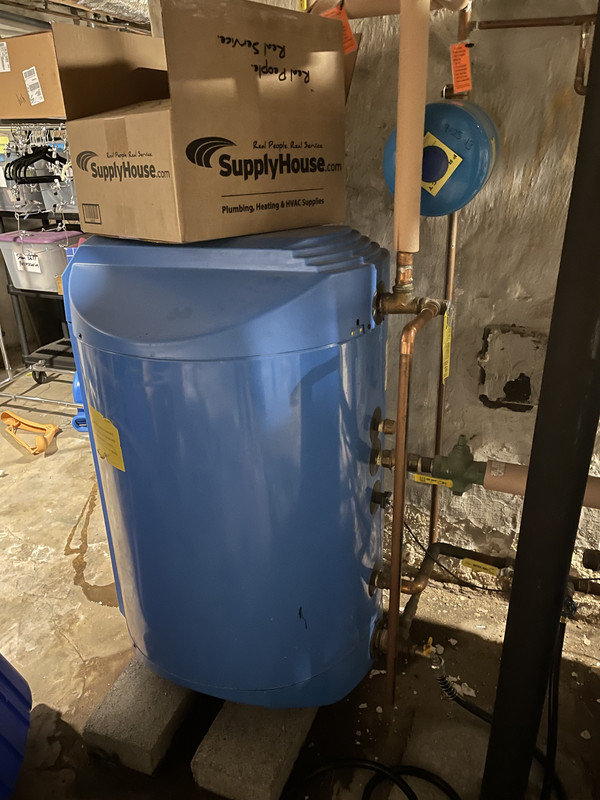

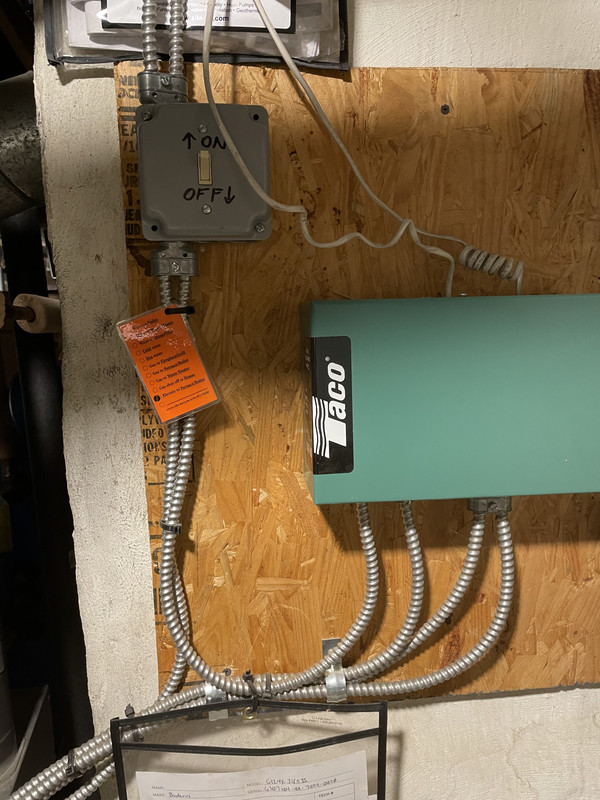

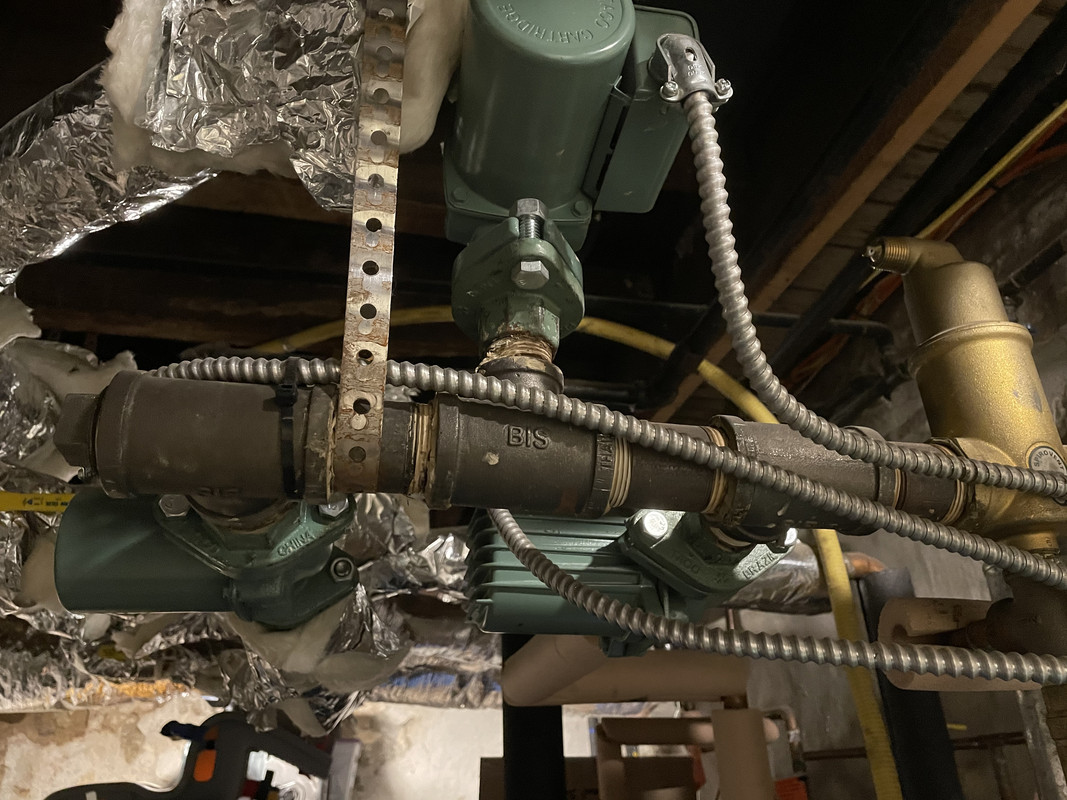
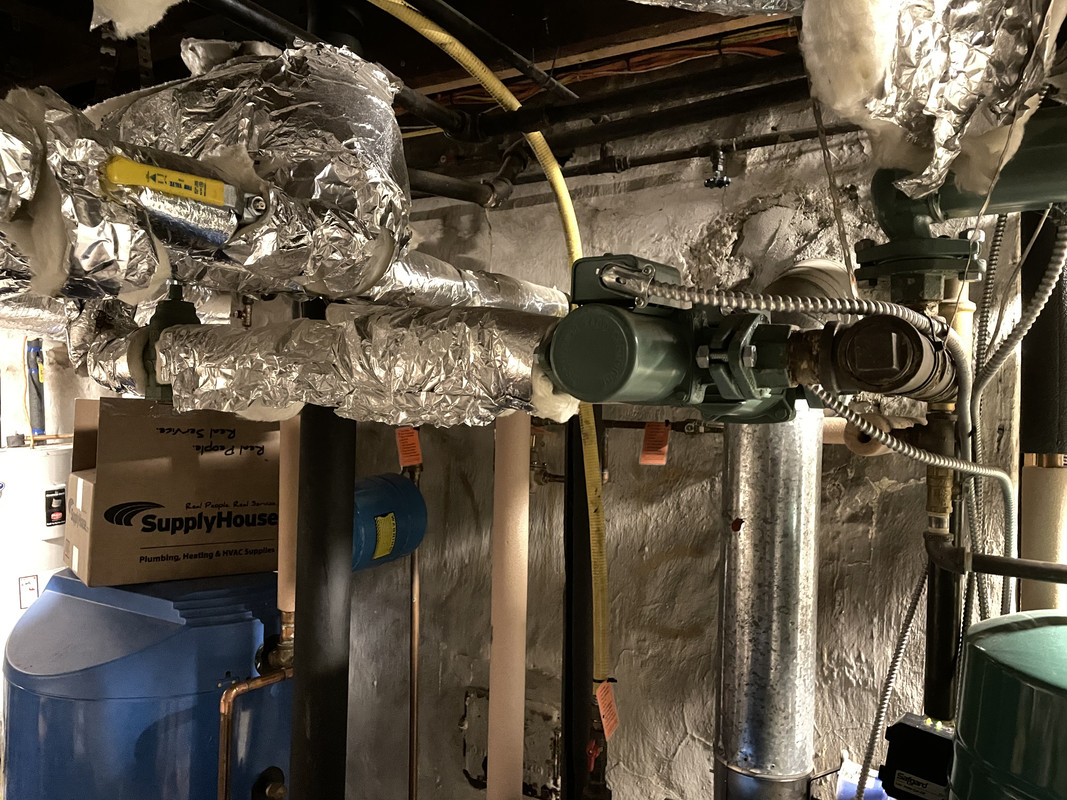
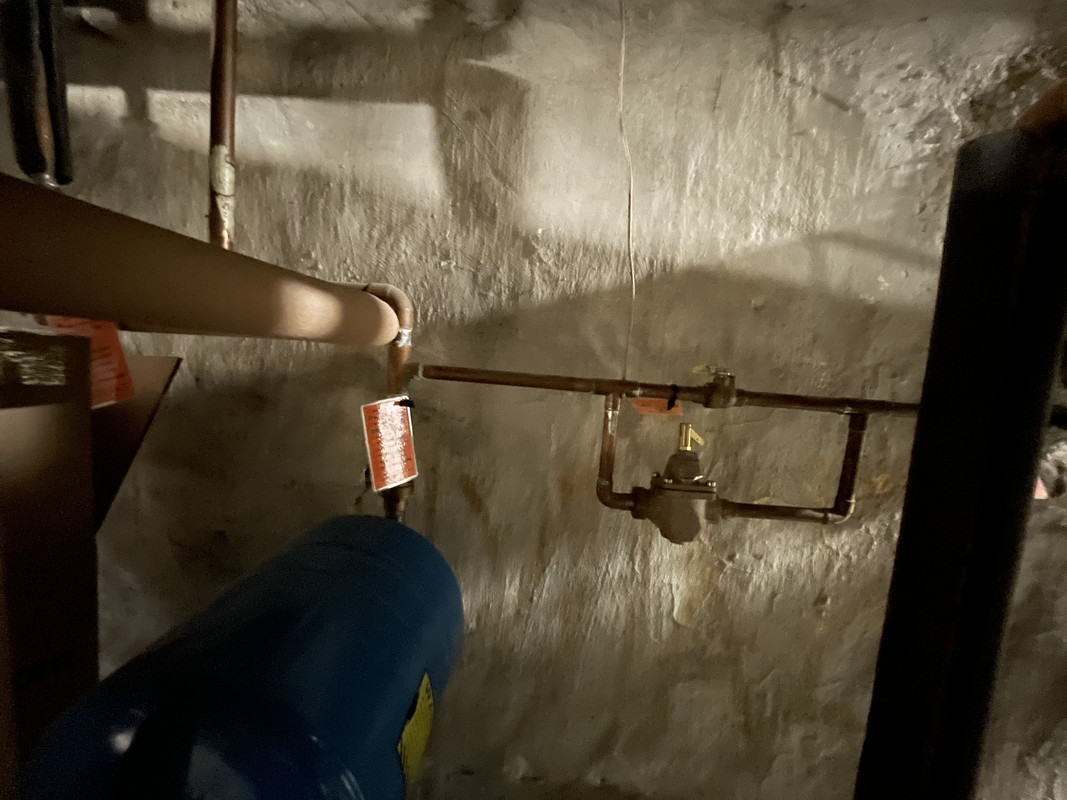
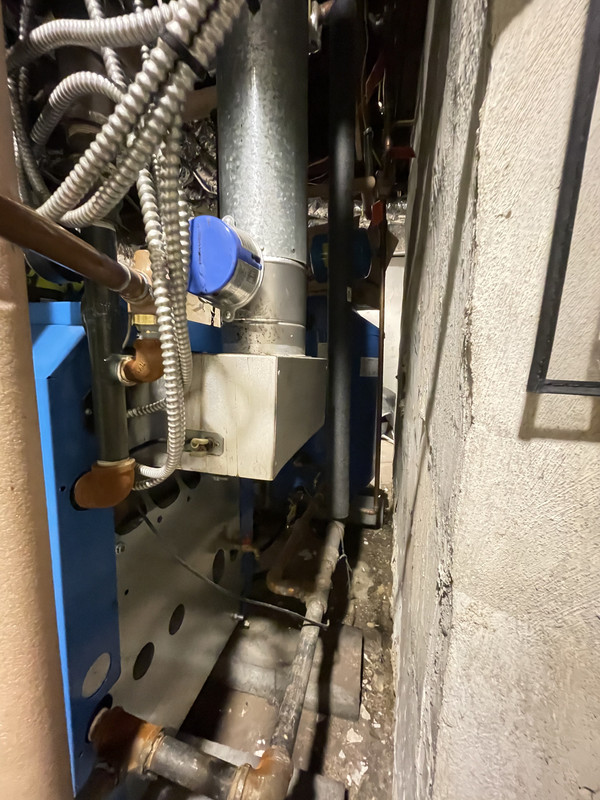
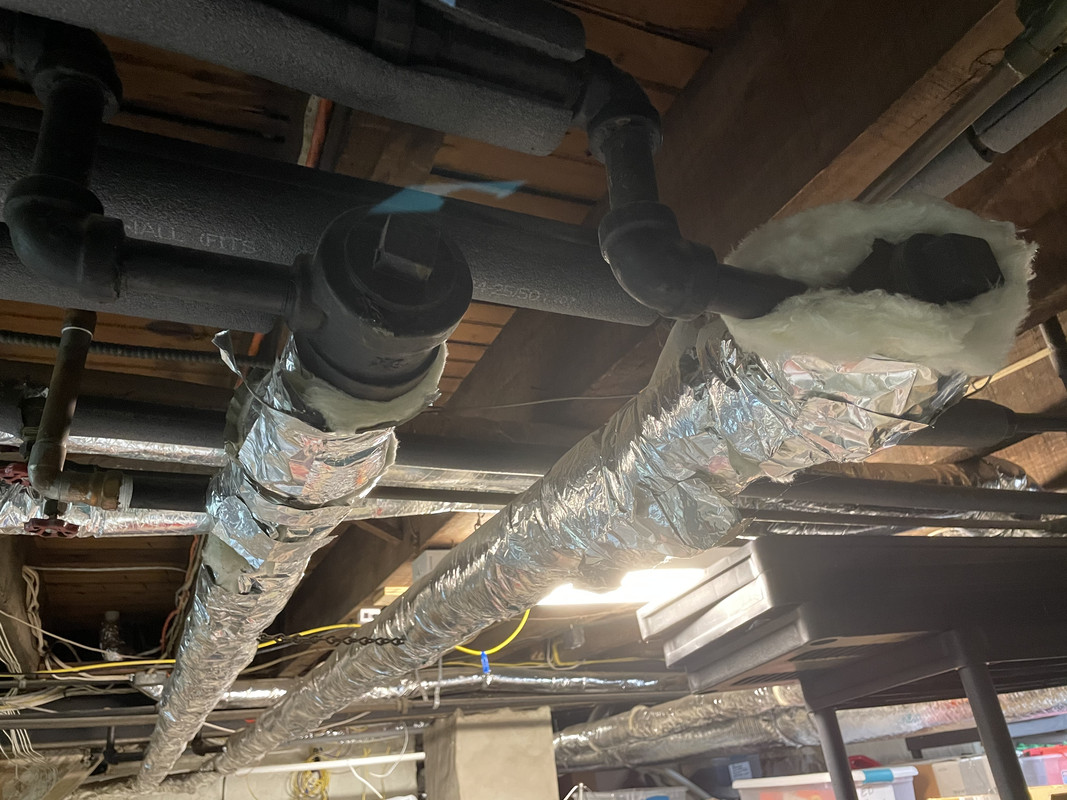
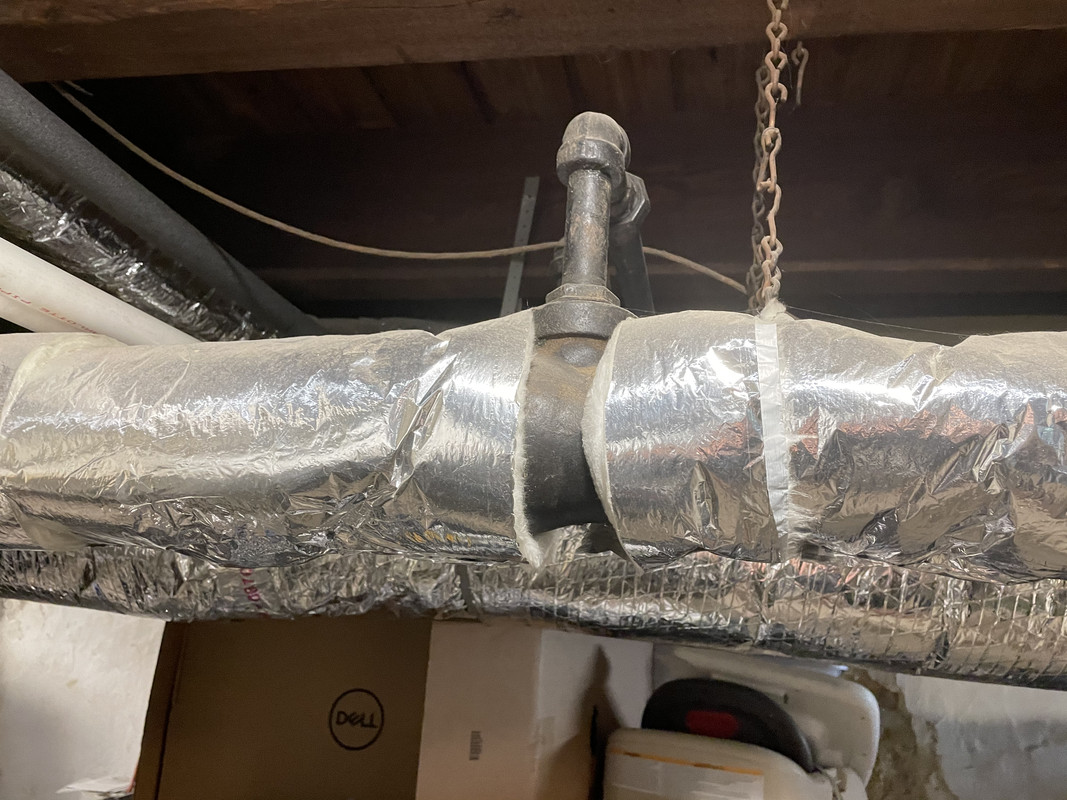
===Short version and question===
- 1927 house, 5 year old boiler (Buderus) and circ pumps, 1 zone plus indirect hot water
- About 14 radiators currently connected
- Pressure dropping to 5psi but then holds steady there with house staying warm
- Do I have a leak somewhere? How do I diagnose where?
===Longer version===
This is the first boiler/radiator home I've lived in (bought 1.5 years ago), so at the beginning of the heating season we had the company out that installed the new boiler in 2015. That routine maintenance visit was very frustrating in retrospect. The tech checked a few valves, gave a cursory glance in the boiler with a flashlight, and then checked the OPV. The OPV kept dripping for at least 5 minutes after he flipped it, and he fiddled with it for most of that time before it finally stopped dripping and he declared that to be normal. My understanding after reading Inspectopedia this week is it's not and would have benefitted from replacement. I also mentioned that visit that I had tried adding water (with the boiler cold) to get to 15 psi as the third floor radiators were developing air pockets even after I bled them and were bleeding really slowly, as I'd read that for a third floor installation (four stories up from the boiler which is in the basement) you should aim for 15-18psi. The pressure had dropped back down to 12 psi, which didn't seem right. That was also declared to be normal.
Then a few weeks ago the pressure started dropping further, from 12 to 11 to 10, to 7, to 5(!). I tested the low water cutoff which still worked, so kept the system on so the family had heat and called an escalating number of HVAC and plumbing companies my neighbors recommended, but have had a devil of a time getting someone out. I currently have an appointment for next week with someone whom one of my neighbors trusts a lot.
I also read two of Dan Holohan's books (Classic Hydronics and Pumping Away) and read through a fair number of The Wall posts which helped a lot to understand the system. The more I learn the more worried I am that something is seriously wrong.
On Friday I woke up to a lukewarm bath, said "uh oh," and went to the basement to find the pressure at a tad below 5psi. I added water to get it to 12 psi, overshot a little, decided to test the OPV which would also bleed off a little extra pressure, and the OPV stuck open (a few gallons per hour) despite all attempts at fiddling. At that point I turned off the system, we used space heaters and the gas fireplace, and I spent the day replacing the OPV with an equivalent Watts from Lowe's. Drained the system completely, fixed the valve, refilled repeatedly to 18 psi to help bleed the radiators with the system off, turned the system on, everything got hot (went from 55F house temp to 65F house temp in a few hours). This morning, pressure was back at 5psi.
Hot water circuit's expansion tank (dated 2015) sounds ok from tapping on the side (dull at the top where the water connects, empty at the bottom where the schraeder valve is) and was at 11.5 psi when I checked with the water valve off. Anything else I should check on the expansion tank? The indirect hot water expansion tank sounds water-logged (dated 2013) but that shouldn't affect the boiler hot water circuit, I believe.
Do I have a leak somewhere? How do I diagnose where? Should I check/replace the radiator valves first?
My best guess: there's been a small leak for a long time, the autofill was masking it by adding water to keep it to 12 psi, this crudded up the OPV which leaked, and then the autofill failed or was misadjusted which caused it to drop to 5psi which revealed the problem.
We really don't want a whole crew in the house tearing up pipes until COVID is over, so if it is a leak can we just fix the autofill and leave it at 12psi for the rest of the winter?












0
Comments
-
Well, sad to say you probably do have a leak somewhere -- the question is, where, of course. However, on the bright side, it can't be that big a leak -- it doesn't take much water in a system such as yours to go from good pressure to low pressure.
The pressure relief valve shouldn't drip. At all. I'm glad you replaced it. Is the new one leaking as well? Or even releasing? Can you tell?
You do need to keep the system at at least 15 psi in a house that tall. Otherwise, as you have observed, the upper radiators may not get enough circulation and heat. In my opinion, until you find the problem, there is no harm to checking the system from time to time and refilling it manually to 15 psi as needed. This will buy you some time to begin to figure out where the problem is.
Start by going around to all the radiators and making sure that their valves aren't leaking. The most likely place is around the valve stem, but sometimes the connections to the pipes -- the unions -- can develop leaks as well. Then, do you have a way to valve off whole sections of the system? If you do -- when the weather is, perhaps, a little more pleasant, you can shut off sections and see what happens to the rest of the system. You can even do this with the boiler itself -- but not when it's cold out!Br. Jamie, osb
Building superintendent/caretaker, 7200 sq. ft. historic house museum with dependencies in New England0 -
I have seen old gravity water systems that had a return under the floor for basement rads.
Also some had buried outside pipes to detatched car garage/carridge house.
These were capped off on the rad end but there still was buried pipe that had the potential to leak.
So do you have any pipes coming in or out of basement floor or exterior basement walls?
Or an attic open tank that is valved off from the system, but valve is not 100% closed and attic tank has over flow pipe connected into sewer drain piping. Could be seeping water thru, you would never see this happening but you might hear it with screwdriver handle stuck against your ear and tip on cold water pipe.0 -
You replaced the feeder. Could be a leak, could be a bad expansion tank
I hope you find a good contractor. You can also check "find a contractor " on this site. And post where you are located. Someone may have a recommendation0 -
That brand boiler feed is prone to sticking , Lift the lever and return to the down position to free it up . This is no fix for the leak ...
There was an error rendering this rich post.
0 -
Jamie, thanks for the confirmation it’s a leak somewhere. The new OPV is working great. The bucket underneath is dry as a bone with no drips even at 20psi.
Jamie and Jughne thanks for the tips on where to look. The basement is pretty open and I can follow the pipes for most of it and don’t see leaks there, including to where the pipes head over to the garage (now capped). The other side of the house also is built on a slab (just a indoor porch) and has baseboards. I assumed it was electric but it’s now cold so maybe on the boiler loop and I can check there for leaks.
Ed, already called the only contractor in the database who was close enough to make it here. No availability but that was before the heat went off. Will try again.
Big Ed, I’ll see what I can jigger free on the auto feed.
New problem: boiler won’t light! The owners manual has a whole troubleshooting flowchart for it so I’ll work my way through that. Stay tuned.0 -
Contractor in the database kindly made room for me tomorrow as soon as roads are clear from the blizzard.
Troubleshooting on the boiler points to something electrical - the ignition module (Honeywell S8600H) lights intermittently, blinks a status light 5 times. Sometimes the spark plug clicks nicely, sometimes it doesn't even try. I suspect it's either a grounding issue or the module just needs replacement.0 -
If it was running on low pressure because of a bad prv for extended periods, it could have rather large pockets of air in the radiators, especially the top ones, that are slowly being removed by the automatic air vent.0
-
Matt - Definitely at least one does. Will try to re-bleed them before the contractor gets out to re-light the boiler tomorrow.0
-
Make sure you keep manual feeding it as you bleed it if you can't get the PRV to start functioning correctly. The fresh water will also bring some dissolved air with it. The air pockets will eventually dissolve in to the circulating water and be removed by the automatic air vent if the air vent is at the right spot in the system.0
-
Thanks. Was manual feeding yesterday after every bleed; today found out the screw adjuster that should set the pressure was quite loose, after tightening it has been holding steady at 15. Doesn't stop the leak, but hopefully it's not dumping water in my walls somewhere and will at least get us limping along for a while as long as the boiler ignites.
Air vent is a spirovent right at the point of no pressure change as I understand it, so it should take bubbles out eventually.0 -
I had some leaks after modifying 2” original lines when I nicked the pipe thread when grinding off a old 2” - 3/4” elbow fitting.
 Found that 1 qt Hercules boiler liquid additive did the job.https://www.supplyhouse.com/Hercules-30-115-1-qt-Boiler-Liquid-4101000-p?gclid=Cj0KCQiA6t6ABhDMARIsAONIYyyfVg4lu2Eu26PBCUXxl4Oawbk9YaQqCbaNSsxaJ8sLNVlw74lr2aoaAsxtEALw_wcB
Found that 1 qt Hercules boiler liquid additive did the job.https://www.supplyhouse.com/Hercules-30-115-1-qt-Boiler-Liquid-4101000-p?gclid=Cj0KCQiA6t6ABhDMARIsAONIYyyfVg4lu2Eu26PBCUXxl4Oawbk9YaQqCbaNSsxaJ8sLNVlw74lr2aoaAsxtEALw_wcB
Since then I’ve learned to use tape and paste when working with old pipe sections.0 -
Thanks PC7060. That's quite the leak!
I read a bunch of old threads on Hercules Boiler Liquid while deciding to buy it in Lowe's yesterday, decided against since it seems like it can mess up your boiler pretty bad and the boiler is the one thing I got going for me? (at least a the time, before it refused to igite!).0 -
That’s the in process picture of the grinding cuts I made to break the fitting loose. Here’s the after removal pic completed pics.gsk3 said:Thanks PC7060. That's quite the leak!You can see the nick in the threads of the rear 2” pipe. I ran the boiler liquid in my old cast iron unit for years without issue. Not sure I’d do the same with a ModCon but theoretically it only hardens when water is bake off in presence of air.
I ran the boiler liquid in my old cast iron unit for years without issue. Not sure I’d do the same with a ModCon but theoretically it only hardens when water is bake off in presence of air.
 0
0 -
Oh interesting. I didn’t know it needed air to harden.
Per an earlier suggestion I located and cut off the valves to the patio baseboards so maybe the leak was there. There are three circ pumps all with cutoffs so at least with some tinkering I can figure out which part of the system has the leak.
Thanks so much for the help so far.Any tips or diagnostic thoughts on the igniter problem? I flipped it back on a minute ago and it started right up (sparks then the main burner catches), then cut off abruptly a minute later, then some cycles of sparking with no catch over and over, with a blinking status light on the 8600H module. Manual for that module says nothing about a status light.
Then I flipped it back off and back on and the circ pumps run like always but the status light doesn’t come on and it doesn’t try sparking the pilot at all. This is a G124X II (auto igniter) version. Possibly interesting: burner was completely replaced last year which I believe comes with a new pilot module/sparker.0 -
Dirty flame rod or bad ground. Ball wicking or even sometimes teflon tape would be the way to seal up damaged threads.0
-
Hopefully the tech finds that your burners are not wet from a pinhole leak, causing no spark.
I shouldn't even say anything...... :'(0 -
Thanks for that unhappy thought! At one point before the boiler turning off I wondered the same. Would explain why I can’t find a leak anywhere.
Hopefully just a ground.0 -
Well after I bled the upstairs radiator and turned the system pressure up to 15 psi and fixed the autofill, the third floor bathroom radiator that's never worked even when bled properly apparently dripped out the valve overnight.
Good news: maybe I found the leak.
Bad news: water dripping from second floor bathroom's ceiling now.
The radiator giveth and the radiator taketh away.0 -
Was able to get someone out today. Turned it on and it started right up, without any of the short cycling or silence or startups I was intermittently seeing. It did cut itself off once inappropriately, and we saw the low water cutoff flash at that point. Then after cycling the power it resumed and kept going. Currently heating up the house.
Maybe the same mineral deposits/rust that contributed to the OPV's demise fouled up the sensor on the low water cutoff. Or maybe just a wire moved that was causing a ground where there shouldn't be. For now, there's heat and I'm happy.
He's going to come back another day and do the low water cutoff.
He did say that he didn't think a third floor radiator would cause it to drop to 5psi because it's so high up. If that sounds right we may have to find another source for the leak at some point.
Anyway, thanks for your help everyone. It was huge to be able to talk it over with folks as knowledgeable as you.0 -
Very coincidental, I recently experienced a somewhat similar situation in a similarly aged house with a converted gravity system (and a TT 110 Prestige) with an indirect HW tank, 2" mains running around the basement. My prv was dripping and the pressure was climbing to 30#. I put a bucket under the prv's drain and it continued to leak even after I readjusted the makeup water to 12 psi and drained it back to 12# several times Then one morning we awoke to a cold house--I found the gauge reading 0 psi. I tested the expansion tank by tapping it, it sounded fine. I isolated the makeup water feed but it continued. Long story short, it was the expansion tank. Seventy bucks later, it seems to be back to normal.0
-
I maintain an old gravity system, has newish boiler etc.
I purposely leave air in the 2nd floor rads as that floor is not in use.
They do not produce much heat. The valves are such that even when off they still pass some flow to prevent freezing. As I have a LWCO, I keep the supply valve shut off and have not lost any appreciable pressure.
So if your 3rd floor rads are not completely filled, that is they have an "air head" at the top of them. That air can act as additional expansion tank volume.
If you are slowly losing that 3rd floor air then the pressure should drop.
A small air leak would not pass water. If you had one it could be an air bleed valve not sealing tightly.
If your fill valve is set to 18 PSI and the supply valve is on, then if you lose that phantom air reservoir the fill valve should compensate.
Is this the case??0 -
What size of exp tank do you have?
The system I described above need the next size larger.....it was only 2 floors of CI.
Too small of a tank will give you relief valve opening or dripping.
FWIW0 -
Thanks Jimbo and JUGHNE.
Had someone out for the second time today. Woke up in the morning to find 30-40 gallons on the ground in the basement. Spent an hour tracking it down to the one damp pipe, which led through concrete to the front door radiator. The tech came out and unscrewed those pipes and mud-brown water poured out and the pipe was just flopping around. So house must have settled or expansion/contraction of ground eventually cracked it. We don't need that radiator, so put in ball valves and capped it for now.
Then boiler didn't fire up when we turned it back on, even after replacing the low water cutoff. He spent some time with a multimeter, then I think gave up on the fancy German stuff and just wanted to bypass it and use the Taco 3-zone controller that was already controlling the two zones from the house (the Buderus Logamatic control module viewed them both as a single zone, and then controlled the indirect itself).
Everything seems to be working. Fingers crossed!
Thank you so very much for all your help.
JUGHNE - Expansion tank is 6 gallons, seems to be holding pressure at 15psi, OPV has never blown (the old one was sticking not blown), and so it may or may not be ok but one radiator I can't get to so it's acting as a second expansion tank anyway.0
Categories
- All Categories
- 87.3K THE MAIN WALL
- 3.2K A-C, Heat Pumps & Refrigeration
- 61 Biomass
- 429 Carbon Monoxide Awareness
- 120 Chimneys & Flues
- 2.1K Domestic Hot Water
- 5.8K Gas Heating
- 115 Geothermal
- 166 Indoor-Air Quality
- 3.7K Oil Heating
- 77 Pipe Deterioration
- 1K Plumbing
- 6.5K Radiant Heating
- 395 Solar
- 15.7K Strictly Steam
- 3.4K Thermostats and Controls
- 56 Water Quality
- 51 Industry Classes
- 50 Job Opportunities
- 18 Recall Announcements



